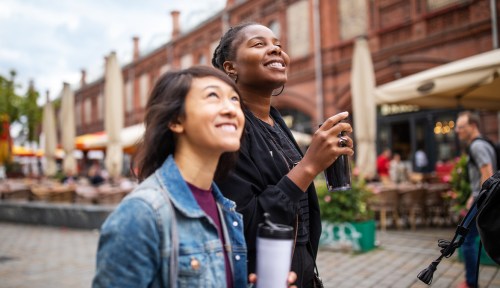At their best, friendships can feel accepting, safe, and magical; as if you and another, when united, have what it takes to fill one another’s world. As a modern love therapist, people often share with me that they feel more seen and heard by their platonic friends than with family, partners, and colleagues. Yet as we age, friendships get complicated, oftentimes instigating confusion and grief. It can be hard to identify when to try to continue to connect, when to give the relationship space for the normal ebbs and flows of closeness, and when to end it with integrity.
Friendships fizzle out for a number of reasons, some explicable and others less so. For instance, it’s understandable to lose touch upon moving across the country, marrying someone with opposing political views, or going through different life stages at different times. In other cases, there’s a lack of reciprocity for no reason, or not enough threads of connection are being woven to continue to build the fabric of the relationship.
If you find yourself realizing you’re less close to someone than before but are not sure why, it can be tricky to decide whether to continue to pursue connection. What’s the difference between normal shifts in closeness and detrimental distance that signifies an end is near? What does it mean if you keep postponing that drink and make excuses about your availability? Should you speak up about what’s not working, or divest in the relationship to make space for more nurturing ones?
With so many demands on our time, we must prioritize who and what is important to us. While we cannot change the behaviors and choices others, we do get to choose who we allow into the ring of our lives.
The case for addressing, rather than ignoring, distance in friendship
When relationships stop feeling good, many of us leave them in limbo rather than directly addressing the challenges. But when we hold on to relationships that don’t feel clear, we create a context of what relationship expert Esther Perel refers to as “stable ambiguity,” or the state of being too fearful to be alone while simultaneously being unwilling to wholly, fully, honestly and completely engage in the development of intimacy.
The blurriness can feel as though we’re in a holding room, waiting to see who will make the first move or the bid for connection. The thing is, these arrangements actually hold us back from pursuing better connections or alternatively saying no to those we don’t want to have a front-row ticket to our lives. No person in the relationship feels like their needs are being met, which can have negative implications for our emotional and physical well-being.
Common reasons why friendships change
Lived experiences as part of growing up
As we grow, our needs change, and so do our relationships. Childhood friendships may have felt stable, filled with rituals like after-school playdates and studying at the library; they felt like they’d last forever. Then there’s a shift with adulthood, when we no longer have the metronome that keeps us all on the same timetable.
We begin to travel down different paths, adhere to different values, and essentially become new people as our lived experiences shape us. While this is completely normal, we do not have a cultural language for addressing these relationship-destabilizing changes. Many of us tend to avoid addressing endings and shifts to avoid the associated grief that comes with them. Change requires loss, so to admit that a friendship is no longer fun or energizing comes with feelings like pain, sorrow, or even anger (the indicator of the presence of unmet needs).
The nuclear family and individualism are primed in American culture—at the expense of friendship
There is a huge investment in the couple and the nuclear family–it is state-sanctioned and financially incentivized with tax breaks and benefits. The dating industrial complex is built on the idea that being single is a problem that needs to be fixed–research and grant dollars are put toward understanding romantic love–recent data show that nearly 370 million people in the U.S. are looking for love online. I could not find a single statistic measuring those who’s seeking friendship online–we don’t measure it, because we don’t culturally value it.
Society isn’t naturally set up for us to make or maintain friendships as adults. This leaves many people feeling isolated and disconnected from community, leaning too much on themselves or their partners to feel nourished. In fact, the percentage of Americans who say they don’t have a single close friend has quadrupled since 1990, according to the Survey Center on American Life.
Capitalism is at odds with relational health.
In a world where being busy and productive is a measure of worth—and an economy built on getting as much labor out of people for as little pay possible— it can be hard to give relationships the type of space and energy they need to thrive. What we nurture grows, and it has become a totally legitimate excuse to blame work for not being able to invest in connection. Friendships are fully voluntary, because there is no binding contract or expectations that we show up at 9 a.m. prepared to engage, like our jobs. As such, many people put platonic friendships on the back burner.
5 questions for making choices in the name of closeness and authenticity
1. Does this relationship have value to me?
Consider the person you’re feeling ambivalent about and ask yourself if they still have worth and importance in your life. What do you appreciate about them? How do you feel in your body when you consider spending time with them?
Also, think about what you still get from the connection. Does the familiarity still have value to you? Does it feel good to have someone who knows about your past in your present? Are there still things you enjoy about each other?
Identify if you can readjust this person’s role and your expectations of them (from best friend to peripheral friend, perhaps). You may decide they still have great meaning to you, but you will no longer try to connect with them in the same way or with the same frequency.
2. How do I feel about giving in this relationship?
If you have started to feel resentment, it means that you are giving beyond your limit. Resentment leads to distance and in some cases contempt—a predictor of relational demise. Consider how you feel about what you’re putting out—your time, your emotional energy, etc.—and ask yourself if there are ways you might need to either conserve your energy and resources or explicitly ask for specific needs of yours to be met.
3. What remains unspoken?
Oftentimes, we believe that if we discuss the tough stuff this will lead to a rupture. In reality, if the act of owning our feelings creates distance or conflict, we didn’t create the problem, we revealed it. Spend some time identifying what it is you might want to say that sounds hard or scary, and consider if the relationship can tolerate hearing it.
If it can’t, share it with another person in your life, so that these feelings still get recognized. If it can, ask yourself what needs to shift for you in order to access the courage inside you to share. Consider doing so an act of advocacy for yourself and for the relationship.
4. Can I wait for this person?
The life course is long. There may be periods of distance with each other, and others of closeness. When someone is going through a hard time, consider if you can give them space to go through their circumstances, while remaining open and connected with the desire for more in the future. How might you let them know you’re giving them space and you’re wanting to connect when they are ready?
5. Can I say goodbye?
In dominant white American culture, goodbyes are often avoided. We do not want to orient ourselves to the grief (defined as the form love takes when someone you love leaves) associated with endings. Instead of denying the ending, and letting the relationship fade, consider engaging in the process of “power parting.” This is a way to end a relationship with kindness and integrity, leaving you and the other with clarity instead of confusion.
These are the four key components of “power parting”:
- 1.Thank you for what I’ve experienced with you,
- 2.This is what I take with me, from you,
- 3.This is what I want you to take with you, from me,
- 4.This is what I wish for you, moving forward.
Many relationships have true beginnings, middles, and ends. The problem isn’t with these stages; it’s when we try to avoid their reality or fight against it. Having the courage to pay attention to how connections feel—and what we want to do about them—allows us to feel empowered. It also creates more opportunities for closeness, either within existing relationships or to make space in our lives for new ones.
Sign Up for Our Daily Newsletter
Get all the latest in wellness, trends, food, fitness, beauty, and more delivered right to your inbox.
Got it, you've been added to our email list.











